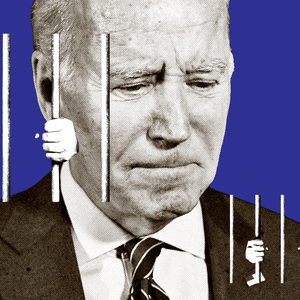Last week, GOP presidential candidate Ron DeSantis took aim at the First Step Act signed into law by former President Donald Trump. DeSantis’s position is perplexing given that the First Step Act has been a true bipartisan success story. As its name suggests, the law should serve as the first step to pursuing further reforms.
DeSantis, however, called it a “huge, huge mistake” to shorten lengthy prison terms. He also spouted complete falsehoods about what the Act accomplished.
Designed to reduce both unnecessarily long federal prison sentences and certain harms of imprisonment, the First Step Act)" href="https://urldefense.com/v3/__https://www.bop.gov/inmates/fsa/overview.jsp__;!!LsXw!S817O5F9BpSfNZbj-2w7ma-CGbNZefwJjrTW7jO2zJ-WFrdQbYbBuhdP4XpSYWeBEvXxZ_xFmNTSXst2-dMqF2bLuCUbnqi4WrmajYJP$">First Step Act promotes community safety by incentivizing people to participate in recidivism reduction programs and other activities that promote a successful reentry. It also rewards people for good behavior in prison by allowing them to earn time credits on their sentence.
The law also allows people to petition judges for a reduction in sentence, called “compassionate release,” based on extraordinary and compelling circumstances, which became an invaluable tool for protecting the lives of vulnerable people in prisons during the COVID-19 pandemic. And, it made retroactive the Fair Sentencing Act, which reduced the notoriously racist 100:1 crack and powder cocaine sentencing disparity.
It’s crucial to point out that the people whose sentences were reduced by the First Step Act have been overwhelmingly successful in their reentry. Among the nearly 30,000 individuals whose release was expedited by the First Step Act, 12 percent)" href="https://urldefense.com/v3/__https://www.ojp.gov/first-step-act-annual-report-april-2023__;!!LsXw!S817O5F9BpSfNZbj-2w7ma-CGbNZefwJjrTW7jO2zJ-WFrdQbYbBuhdP4XpSYWeBEvXxZ_xFmNTSXst2-dMqF2bLuCUbnqi4WiQKQFwz$">12 percent have been rearrested or reincarcerated since their release. A far higher proportion)" href="https://urldefense.com/v3/__https://bjs.ojp.gov/sites/g/files/xyckuh236/files/media/document/rpr34s125yfup1217.pdf__;!!LsXw!S817O5F9BpSfNZbj-2w7ma-CGbNZefwJjrTW7jO2zJ-WFrdQbYbBuhdP4XpSYWeBEvXxZ_xFmNTSXst2-dMqF2bLuCUbnqi4WjjJvHtn$">far higher proportion of people released from state prisons nationwide—37 percent— were rearrested within one year of release. And past research)" href="https://urldefense.com/v3/__https://www.ussc.gov/research/research-reports/recidivism-among-federal-offenders-receiving-retroactive-sentence-reductions-2011-fair-sentencing__;!!LsXw!S817O5F9BpSfNZbj-2w7ma-CGbNZefwJjrTW7jO2zJ-WFrdQbYbBuhdP4XpSYWeBEvXxZ_xFmNTSXst2-dMqF2bLuCUbnqi4WtlVG3Rg$">past research has shown that reducing lengthy federal sentences does not increase recidivism.
Groups across the political spectrum supported the First Step Act—from Right on Crime and the American Conservative Union Foundation to the American Civil Liberties Union and the Leadership Conference on Civil and Human Rights. Many are rightly calling)" href="https://urldefense.com/v3/__https://www.brennancenter.org/our-work/research-reports/first-step-acts-prison-reforms__;!!LsXw!S817O5F9BpSfNZbj-2w7ma-CGbNZefwJjrTW7jO2zJ-WFrdQbYbBuhdP4XpSYWeBEvXxZ_xFmNTSXst2-dMqF2bLuCUbnqi4WhshGiYX$">rightly calling for further reforms.
That’s because of the bipartisan recognition that the growth of our carceral state has not been an effective crime deterrent. Federal prisons imprisoned 25,000 people in 1980. Today, they imprison nearly 160,000 people. And, while the past decade of reforms)" href="https://urldefense.com/v3/__https:/www.sentencingproject.org/policy-brief/one-year-after-the-first-step-act-mixed-outcomes/__;!!LsXw!U71FxGPGzPpgo0FGk6X-BCXT57F735SNON-wUZz0yZl7O4ItXsdT-8EZ5J3cu6CRX9AFT9zkX99wQmWJB-jk5egnbJ6y0f8Eb5kYIq6U$">reforms downsized federal prisons)" href="https://urldefense.com/v3/__https://www.sentencingproject.org/policy-brief/ending-50-years-of-mass-incarceration-urgent-reform-needed-to-protect-future-generations/__;!!LsXw!S817O5F9BpSfNZbj-2w7ma-CGbNZefwJjrTW7jO2zJ-WFrdQbYbBuhdP4XpSYWeBEvXxZ_xFmNTSXst2-dMqF2bLuCUbnqi4Wlh23DvC$"> downsized federal prisons, the federal prison population has grown again over the last two years.
There are many people still in federal prisons who don’t need to be there, because they have aged out of crime and pose little risk to the community. These people, who are disproportionately Black and Latino, should be allowed to return to the workforce and their families.
To rectify these issues, Congress should build on the First Step Act by passing the bipartisan First Step Implementation Act)" href="https://urldefense.com/v3/__https://www.congress.gov/bill/118th-congress/senate-bill/1251__;!!LsXw!S817O5F9BpSfNZbj-2w7ma-CGbNZefwJjrTW7jO2zJ-WFrdQbYbBuhdP4XpSYWeBEvXxZ_xFmNTSXst2-dMqF2bLuCUbnqi4Wk03xL6j$">First Step Implementation Act and the Safer Detention Act)" href="https://urldefense.com/v3/__https://www.congress.gov/bill/118th-congress/senate-bill/1248__;!!LsXw!S817O5F9BpSfNZbj-2w7ma-CGbNZefwJjrTW7jO2zJ-WFrdQbYbBuhdP4XpSYWeBEvXxZ_xFmNTSXst2-dMqF2bLuCUbnqi4WsSHjKBp$">Safer Detention Act.
The First Step Act currently (and arbitrarily) excludes the oldest people in federal prisons—those convicted prior to Nov. 1, 1987—from applying to courts for compassionate release. The Safer Detention Act would make them eligible, while also allowing elderly people who have served the majority of their sentence, and who the BOP deems low risk, to return to their families via the elderly home detention pilot program.
The First Step Implementation Act would ensure fairness by applying the First Step Act’s sentencing reductions to people incarcerated under the old sentencing regime. When Congress passed the First Step Act in 2018, it made clear that it considered some sentences too long and shortened them. It’s only fair that the people sentenced prior to this law should receive that relief, as well. It would also allow courts to consider sentence reductions for people who committed crimes under the age of 18 and have served at least 20 years behind bars.
Lawmakers need to not only allow thousands—including the oldest and sickest people in federal prisons—to return home to their loved ones and communities, but also eliminate costly, pointless incarceration that keeps people from entering the workforce and supporting their families.
Fifty years after the beginning of mass incarceration, presidential candidates should be making the case for how they will do their part to end it. Congress should pass the First Step Implementation Act and Safer Detention Act and the current and future administrations must do their part to support these and other critical reforms and ensure their successful implementation.
Nazgol Ghandnoosh is Co-Director of Research and Liz Komar is Sentencing Reform Counsel at The Sentencing Project.










